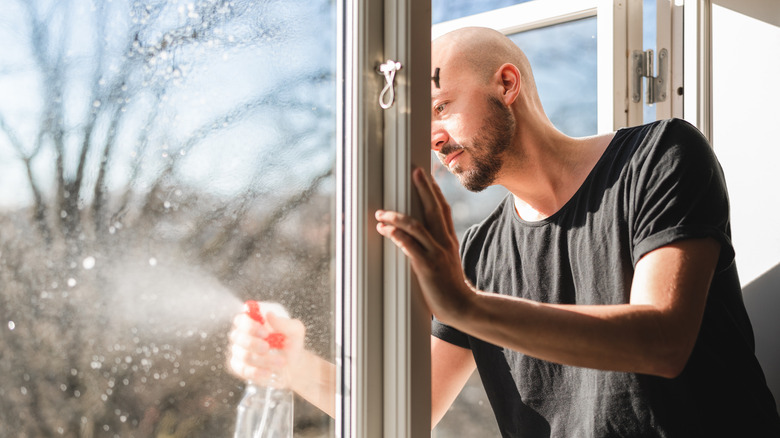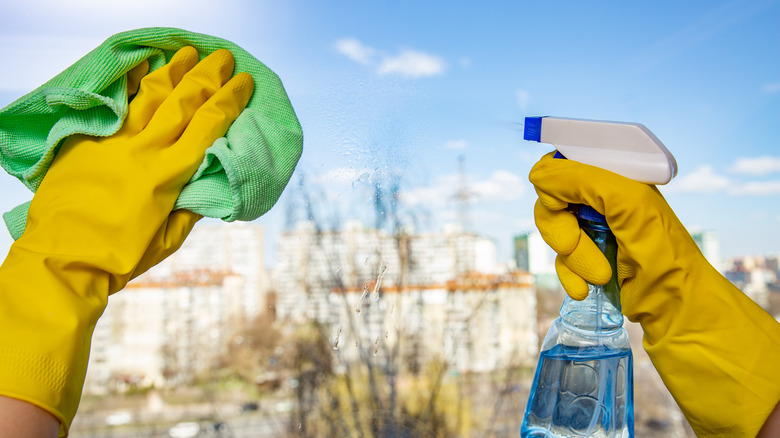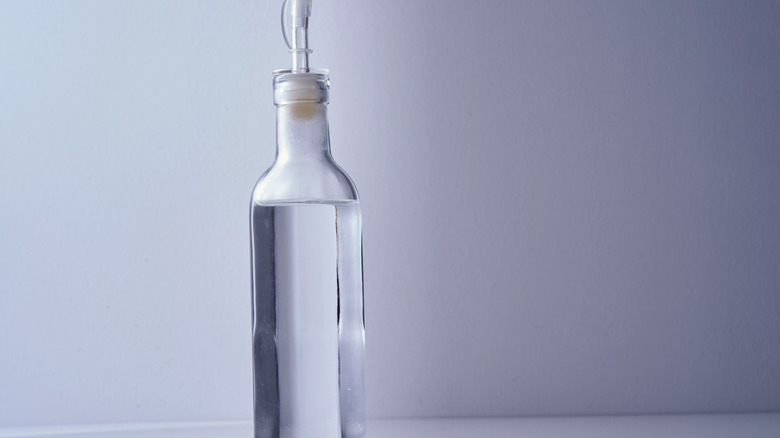Is Vinegar The Secret To Dazzling Clean Windows?
Windows can be one of the most difficult items to tackle in your home-cleaning routine. Their pristine surfaces can be marred by water stains, oily fingerprints, cloudy film, and more. It may seem like you need a dozen different products just to get them sparkling clean — but can one DIY cleaning staple be the answer? Vinegar, specifically distilled white vinegar, is often prescribed as the one-size-fits-all cleaning solution (with varying results). And in this case, it does seem to be a solid contender for tackling dirty windows and glass.
Why use white vinegar for cleaning windows? Thanks to its low pH balance, vinegar is very acidic, which is one of the main categories of cleaning products, in contrast to alkaline products such as dish soap or neutral cleaners like rubbing alcohol. Acidic solutions break down hard mineral deposits like magnesium and calcium found in hard water, as well as greasy residues left behind from fingerprints and cooking oil, both of which can be major contributors to dirty, dingy windows. And unlike water and some other cleaning products, vinegar doesn't leave a residual film behind, giving your windows a streak-free shine. Vinegar can go a long way toward crystal clear windows, but there are still some tips for making it as effective as possible.
Using vinegar effectively as a window cleaner
Vinegar is a versatile cleaning tool on its own, but it can also be diluted and aided by other household staples. You may consider diluting it with water, to start. Vinegar doesn't need to be concentrated to clean windows, and mixing it with water can help to stretch it, as well as reduce the potency of the smell. If you have particularly hard water in your home, consider using filtered, distilled water in this mixture. This will prevent additional hard water mineral stains.
Another great addition to use alongside vinegar on windows is simple dish soap. Dish soap, like vinegar, can effectively break down grime and grease, but it does so in a different way. Dish soap is a true soap, which differs from detergents, and is made up of water-attracted and fat-attracted molecules. When combined with water, soap bonds to both fat and water molecules found in grease and grime, gently breaking down the residues. By using both acidic and neutral-alkaline (depending on the soap's formula) cleaning agents, you can harness the cleaning powers across the pH spectrum, and tackle more window-staining ailments at once. Just mix the water, soap, and vinegar into a spray bottle for an easy, affordable DIY window cleaner. You should also use a lint-free microfiber cloth to wipe the windows to prevent streaking.
Vinegar vs. standard cleaners
There are a few reasons to go for vinegar over commercial cleaners. For one, it's best to use as few chemicals as possible when cleaning your home. That's because some cleaning chemicals can cause irritation, in people and pets. By limiting the number of products being used while cleaning, you can reduce the chance of such a reaction. Vinegar is sometimes found in commercial cleaners anyway, or used as a boosting agent, as seen in Windex's vinegar glass cleaner formula.
However, one mistake people make when opting for vinegar over commercial cleaners is thinking that because vinegar is natural and found in food products, it is inherently non-toxic. But just like other cleaning agents, vinegar can be dangerous if inhaled or exposed to skin for long periods, or consumed and ingested in large, concentrated amounts. So be sure to store it safely out of reach of children and pets, allow for plenty of ventilation while using it for cleaning, and consider diluting it. Also, vinegar is great on glass but can easily eat through the finishes of some materials such as marble, wood, and other porous surfaces. So if you do use vinegar on your windows, ensure it stays on the glass and other vinegar-safe finishes.


